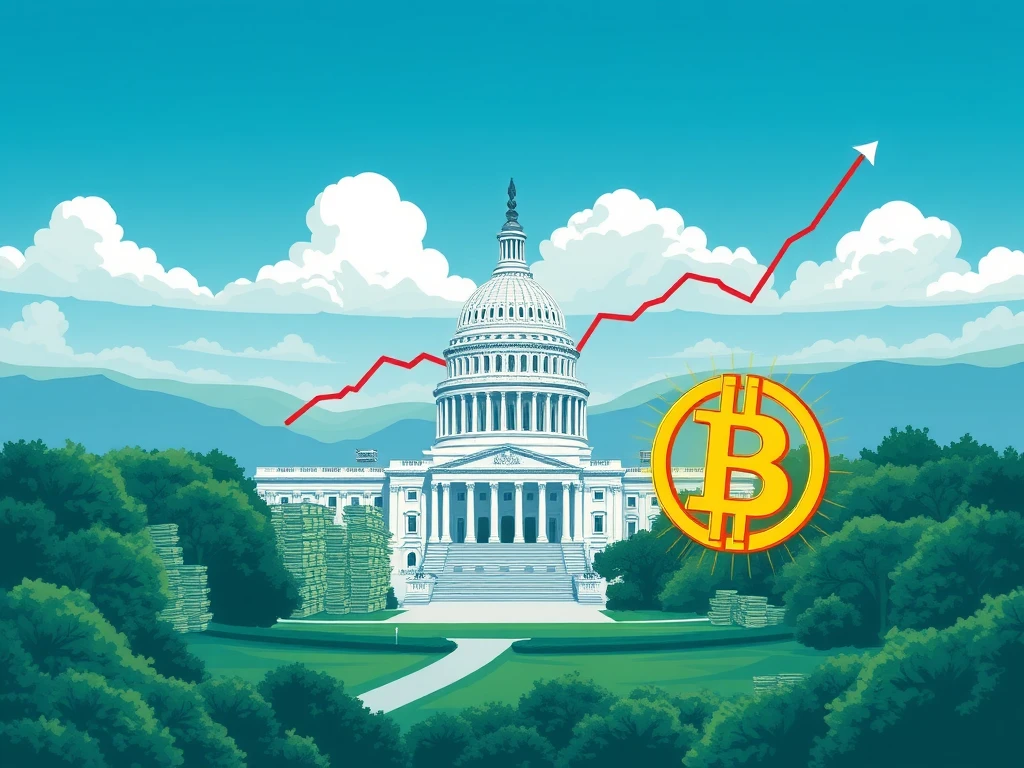Bitcoin: Urgent Warning as Trump Bill Could Deepen US Debt Crisis

Are you concerned about the future value of your money? With talks of significant spending increases and potential tax cuts on the horizon, many are looking at the growing US Debt and wondering what it means for the economy. This is particularly relevant for those interested in digital assets like Bitcoin, which some see as a potential safeguard against economic instability.
Understanding the Potential Impact of the Trump Bill
President Trump’s proposed legislation, dubbed the “Big Beautiful Bill,” has passed the House and is now under consideration in the Senate. Its potential impact on the national finances is significant. Here’s a breakdown of key aspects:
- Extends 2017 tax cuts, reducing federal revenue.
- Eliminates certain green energy incentives.
- Tightens eligibility for Medicaid and SNAP benefits.
- Authorizes expansion of immigration enforcement.
- Raises the debt ceiling by $5 trillion.
According to nonpartisan analyses, the bill could add trillions to the national debt over the next decade. The Congressional Budget Office (CBO) estimates a net addition of $2.4 trillion, while other forecasters suggest the cost could rise to $3 trillion or even $5 trillion if temporary tax cuts become permanent. This substantial increase fuels concerns about accelerating the existing Debt Crisis.
Why Inflation Looms and the US Debt Crisis Deepens
The US budget deficit is already substantial, and efforts to significantly cut spending have faced challenges. With interest rates still a factor and a large debt pile, the cost of servicing the national debt continues to grow. The passage of the Trump Bill could significantly exacerbate this situation.
Some argue that tax cuts could stimulate the economy enough to offset the debt increase, but past experience, like the 2017 tax cuts, suggests otherwise. The scale of the current deficit and debt makes relying solely on economic growth unrealistic. Experts point out that growing out of this debt without spending cuts or tax increases would require unsustainable levels of real GDP growth.
As the spiral of deficits and debt deepens, governments facing a debt crisis often turn to certain tools. Austerity, defaults, and wealth redistribution are politically difficult. Printing money and currency devaluation become the path of least resistance. This leads to Inflation, silently eroding the purchasing power of cash and bonds.
Bitcoin as a Hedge Against Inflation and Debt
This is where Bitcoin enters the conversation. Unlike fiat currencies, which can be devalued by government policy, Bitcoin has a fixed supply and operates independently of central banks. This makes it attractive as a potential hedge against the devaluation of the US dollar and the effects of Inflation driven by a growing US Debt.
In a scenario where the government might resort to financial repression to manage the Debt Crisis, the stability and scarcity of Bitcoin offer an alternative. However, it is crucial to understand that the protection Bitcoin offers is most robust when held in self-custody. Custodial platforms, like certain ETFs, could face challenges in a severe financial crisis, potentially limiting access to your assets.
Self-custody, holding your own private keys in cold storage, provides true control and resilience against potential government actions or platform failures during times of economic stress. As fiscal policy continues on its current trajectory with little political will for significant change, hard assets held securely may become increasingly important.
Summary: Navigating Potential Economic Headwinds
The potential passage of the Trump Bill highlights the ongoing concerns about the growing US Debt and the increasing risk of a Debt Crisis. This situation makes the prospect of higher Inflation more likely, potentially eroding the value of traditional assets like cash and bonds. For those seeking alternatives, Bitcoin offers a unique proposition as a decentralized, scarce asset. However, the key to leveraging Bitcoin as a hedge lies in securing it through self-custody, ensuring control and resilience in uncertain economic times. As the debate around fiscal policy continues, staying informed and considering potential hedges is essential.








